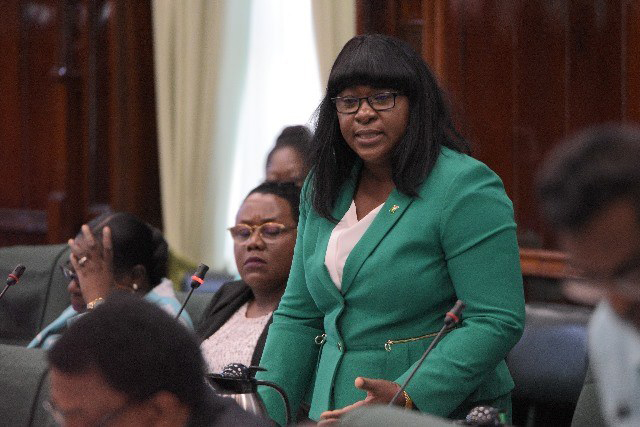With an increase in the incidence of the multi-drug resistant strain of Tuberculosis, government will resuscitate the Directly Observed Treatment Short-Course (DOTS) strategy to ensure adequate detection, treatment and monitoring, Minister within the Ministry of Public Health (MoPH) Dr. Karen Cummings yesterday said.
She was at the time making her contribution to the debate of the government’s proposed 2019 national budget in the National Assembly, where she argued that the proposed increase in the budgetary allocation to the public health sector shows that government is working assiduously to ensure that Guyanese live healthy lives, even as her opposition counterpart Dr Vishwa Mahadeo questioned the contraction of some programmes.
Cummings stressed that the threat of antimicrobial resistance (AMR) is real and cannot be ignored, so the MoPH will be collaborating with the Ministry of Agriculture to tackle same through enhanced public awareness, antibiotic conservation, and increased surveillance.
Speaking on four of the MoPH’s seven programme areas, Cummings told the House that with its proposed $35.9 billion, $2.6 billion more than in 2018, the ministry will work to fulfil its mandate of preventing, curing and managing illnesses, while delivering the best possible citizen-patient experience in a financially sustainable way.
Measures to be implemented in pursuit of this mandate include the development of a microbiology lab with AMR as a priority and the implementation of sexually-transmitted infections (STIs) point-of-care tests (POCTs), which allow diagnosis and treatment in a single visit.
Also being carefully monitored, according to the minister, is HIV. Government has been absorbing the HIV programme gradually and will institute a social contracting piloting process for 2019. This will allow for contracts with Non-Governmental Organisations to deliver prevention programmes to key affected populations, with the treat all policy geared towards the 90/90/90 UNAIDs target.
This target hopes to diagnose 90% of all HIV-positive persons, provide antiretroviral therapy (ART) for 90% of those diagnosed, and achieve viral suppression for 90% of those treated by 2020. At the end of 2017, Guyana stood at 70/75/65 of this target but, according to Minister Cummings, with the treat all policy for HIV, more persons are to be placed on antiretroviral treatment and the number of new cases should reduce with time.
Currently, there are 5,390 eligible adults and children receiving ART, while the number of newly diagnosed HIV cases as of May, 2018 was 247.
The HIV STI POCTs have already been introduced, Cummings said, with pilot programmes commencing in July, 2018 and 46 positive cases were detected. Additionally, 77 healthcare workers have been trained.
“There have been strategies and targeted interventions to address adolescents with HIV,” the minister also mentioned, before adding that the Global Fund has been assisting with some of the strategies and efforts of the Government of Guyana towards targeted interventions to address HIV.
Mahadeo was, however, unimpressed with this information. Declaring that more money does not mean better service, Mahadeo questioned why the DOTS programme was discontinued when it had seen major success under the previous administration.
“This programme was initiated under then Minister Gail Teixeira. The programme grew and in fact became well recognised. Why it was not happening anymore only this government can say… We should not have stopped it…we would not be hearing of an increase in TB or multi-drug resistant TB,” he said before stressing that multi-drug resistant TB is a killer.
Speaking as a Member of Parliament for Region Six, Mahadeo noted that there continues to be shortages of medicine across the region, with procurement following questionable processes where everything is deemed an emergency and drugs being bought at inflated prices from dubious suppliers.
“Are we satisfied that there are systems in place to ensure accountability?” he asked before adding that while the minister is speaking about measures to combat HIV, the 50 counsellor testers who previously worked in the region have been reduced to one.
“We have one. Yes one…he works at Skeldon for two days, he works at Port Mourant for two days and he works one day in New Amsterdam. Are we really working to combat HIV?” he asked.






